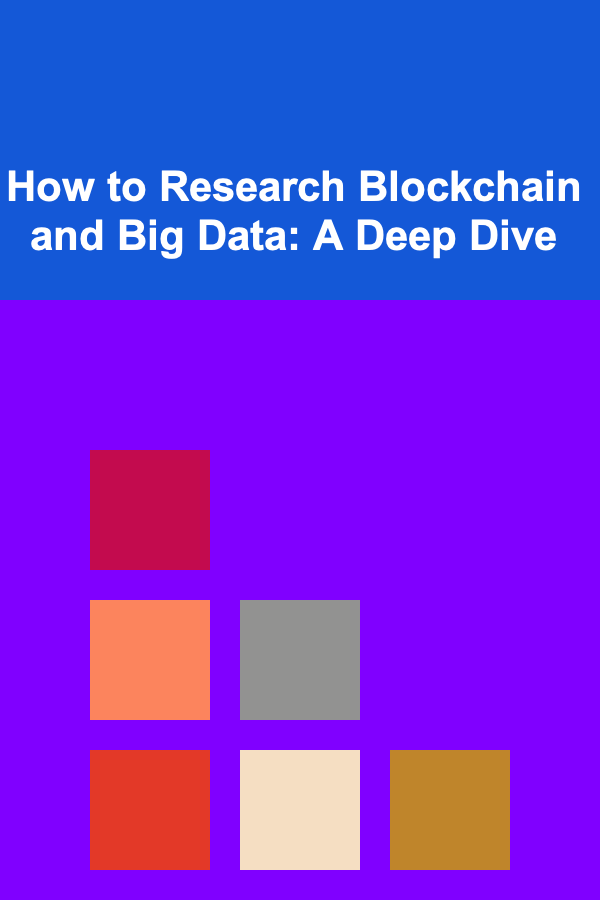
How to Research Blockchain and Big Data: A Deep Dive
ebook include PDF & Audio bundle (Micro Guide)
$12.99$7.99
Limited Time Offer! Order within the next:

The intersection of Blockchain and Big Data represents a powerful synergy that is reshaping industries across the globe. Understanding how to effectively research these complex and rapidly evolving fields is crucial for academics, practitioners, and anyone seeking to stay ahead of the curve. This article provides a comprehensive guide to researching Blockchain and Big Data, covering essential resources, methodologies, and strategies for staying informed and contributing meaningfully to the field.
Understanding the Foundations: Blockchain and Big Data
Before diving into the research process, it's essential to establish a firm understanding of the fundamental concepts behind Blockchain and Big Data. These technologies are often misunderstood, and a clear grasp of their core principles will significantly enhance the quality and effectiveness of your research.
Blockchain Fundamentals
Blockchain, at its core, is a distributed, immutable ledger technology. Key concepts include:
- Decentralization: Data is distributed across multiple nodes, eliminating a single point of failure and increasing resilience.
- Immutability: Once a block is added to the chain, it cannot be altered or deleted, ensuring data integrity.
- Transparency: All transactions are publicly verifiable (although identities can be pseudonymous), fostering trust and accountability.
- Cryptography: Cryptographic techniques, such as hashing and digital signatures, are used to secure the data and verify transactions.
- Consensus Mechanisms: Algorithms like Proof-of-Work (PoW) and Proof-of-Stake (PoS) are used to validate transactions and add new blocks to the chain.
Understanding these concepts is crucial for evaluating the various blockchain applications and their potential impact. Different types of blockchains exist, including public, private, and consortium blockchains, each with its own strengths and weaknesses.
Big Data Fundamentals
Big Data refers to datasets that are too large or complex for traditional data processing applications. The characteristics of Big Data are often described by the "5 Vs":
- Volume: The sheer amount of data generated and stored.
- Velocity: The speed at which data is generated and processed.
- Variety: The different types of data, including structured, semi-structured, and unstructured data.
- Veracity: The accuracy and reliability of the data.
- Value: The potential insights and benefits that can be derived from the data.
Big Data technologies include distributed storage and processing frameworks like Hadoop and Spark, NoSQL databases for handling diverse data types, and advanced analytics techniques like machine learning and data mining. Understanding these tools and techniques is essential for researching how Big Data can be leveraged in various applications.
Identifying Research Areas: The Intersection of Blockchain and Big Data
The combination of Blockchain and Big Data opens up a wide range of research opportunities. Identifying specific areas of interest will help you focus your research efforts and avoid being overwhelmed by the vastness of these fields. Here are some promising research areas:
Data Provenance and Integrity
Blockchain's immutable ledger can be used to track the origin and history of Big Data, ensuring its authenticity and integrity. This is particularly important in industries where data accuracy is critical, such as healthcare, finance, and supply chain management. Research in this area can focus on:
- Developing blockchain-based solutions for data lineage tracking.
- Investigating the use of smart contracts to automate data validation and verification.
- Analyzing the impact of blockchain on data quality and reliability.
Data Security and Privacy
Blockchain can enhance data security and privacy by providing a secure and transparent platform for managing and sharing data. Research in this area can explore:
- Developing privacy-preserving techniques for Big Data analytics using blockchain.
- Investigating the use of blockchain for secure data storage and access control.
- Analyzing the regulatory implications of using blockchain for data privacy (e.g., GDPR compliance).
Data Monetization and Sharing
Blockchain can facilitate the secure and transparent monetization of Big Data by enabling data owners to control who can access and use their data. Research in this area can focus on:
- Developing blockchain-based data marketplaces for secure data trading.
- Investigating the use of smart contracts to automate data licensing and revenue sharing.
- Analyzing the economic impact of blockchain on the data economy.
Supply Chain Management
The application of Blockchain and Big Data to supply chain management offers improved transparency, traceability, and efficiency. Research areas include:
- Developing blockchain-based solutions for tracking goods and materials throughout the supply chain.
- Using Big Data analytics to optimize supply chain operations and predict potential disruptions.
- Investigating the impact of blockchain on supply chain resilience and sustainability.
Healthcare
Blockchain and Big Data can revolutionize healthcare by enabling secure and efficient data sharing, improving patient care, and accelerating medical research. Research opportunities include:
- Developing blockchain-based solutions for electronic health record (EHR) management.
- Using Big Data analytics to identify disease patterns and personalize treatment plans.
- Investigating the ethical and legal implications of using blockchain and Big Data in healthcare.
Financial Services
The financial industry is exploring Blockchain and Big Data for fraud detection, risk management, and improved customer service. Research areas include:
- Developing blockchain-based solutions for secure and efficient payment systems.
- Using Big Data analytics to detect fraudulent transactions and assess credit risk.
- Investigating the impact of blockchain on financial inclusion and access to financial services.
Finding Relevant Research Resources
Once you have identified your research area, the next step is to find relevant research resources. This involves exploring a variety of sources, including academic databases, industry reports, and online communities.
Academic Databases
Academic databases are a valuable source of peer-reviewed research articles, conference proceedings, and dissertations. Some of the most relevant databases for Blockchain and Big Data research include:
- IEEE Xplore: Provides access to publications from the Institute of Electrical and Electronics Engineers (IEEE), covering a wide range of topics in computer science, engineering, and related fields.
- ACM Digital Library: Offers access to publications from the Association for Computing Machinery (ACM), including journals, conference proceedings, and magazines.
- ScienceDirect: A comprehensive database of scientific, technical, and medical literature, including journals and books from Elsevier.
- Web of Science: A citation database that indexes a wide range of journals and conference proceedings across various disciplines.
- Scopus: Another citation database that provides access to a broad range of scholarly literature.
- Google Scholar: A freely accessible web search engine that indexes scholarly literature across various disciplines. While useful, it's important to critically evaluate the sources found on Google Scholar.
When searching these databases, use relevant keywords such as "blockchain," "big data," "distributed ledger technology," "smart contracts," "Hadoop," "Spark," "data mining," "data analytics," and specific applications such as "supply chain," "healthcare," and "finance." Use boolean operators (AND, OR, NOT) to refine your search results.
Industry Reports and White Papers
Industry reports and white papers provide valuable insights into the latest trends and developments in Blockchain and Big Data. These resources are often produced by consulting firms, market research companies, and technology vendors. Some useful sources include:
- Gartner: Offers research and advisory services on information technology.
- Forrester: Provides research and consulting on technology and market trends.
- Deloitte: Publishes reports and insights on various industries, including blockchain and big data.
- PwC: Offers research and consulting services on business and technology topics.
- McKinsey & Company: Provides management consulting services and publishes reports on industry trends.
- CoinDesk: A leading source of news and information about the cryptocurrency and blockchain industries.
- Blockdata: Provides data and analytics on the blockchain ecosystem.
- CB Insights: Offers data and analytics on venture capital, startups, and emerging technologies.
These reports can provide valuable information on market size, growth rates, adoption trends, and emerging use cases. However, it's important to critically evaluate the sources of these reports and consider potential biases.
Online Communities and Forums
Online communities and forums can be a valuable source of information and insights, as well as a place to connect with other researchers and practitioners. Some relevant online communities include:
- Reddit: Subreddits such as r/blockchain, r/bigdata, and r/dataengineering.
- Stack Overflow: A question-and-answer website for programmers, with tags for blockchain and big data technologies.
- GitHub: A platform for software development and version control, where you can find open-source blockchain and big data projects.
- LinkedIn Groups: Professional networking platform with groups focused on blockchain and big data.
- Meetup.com: A platform for finding local events and meetups related to blockchain and big data.
Participating in these communities can help you stay up-to-date on the latest developments, ask questions, and get feedback on your research.
Conferences and Workshops
Attending conferences and workshops is a great way to learn about the latest research and network with other researchers and practitioners. Some relevant conferences include:
- IEEE International Conference on Blockchain and Cryptocurrency (ICBC): A leading academic conference on blockchain and cryptocurrency.
- ACM Symposium on Principles of Distributed Computing (PODC): A conference on the theoretical foundations of distributed computing, including blockchain.
- Strata Data Conference: A conference focused on big data and data science.
- O'Reilly AI Conference: A conference covering artificial intelligence, machine learning, and data analytics.
- Consensus: A major annual cryptocurrency and blockchain technology summit.
- Blockchain Expo Global: A large conference and exhibition focused on blockchain technology.
Presenting your research at conferences can help you get valuable feedback from your peers and increase the visibility of your work.
Developing a Research Methodology
A well-defined research methodology is crucial for conducting rigorous and meaningful research. The choice of methodology will depend on the specific research question and the nature of the data being analyzed. Here are some common research methodologies used in Blockchain and Big Data research:
Literature Review
A literature review is a systematic and comprehensive analysis of existing research on a particular topic. It involves identifying, evaluating, and synthesizing relevant publications to provide a critical overview of the current state of knowledge. A well-conducted literature review can:
- Identify gaps in the existing literature.
- Highlight areas where further research is needed.
- Provide a theoretical framework for your research.
- Avoid duplicating existing research.
When conducting a literature review, it's important to use a systematic approach. This involves defining your search criteria, identifying relevant databases and sources, and critically evaluating the quality of the publications you find.
Empirical Research
Empirical research involves collecting and analyzing data to test hypotheses and draw conclusions. There are several types of empirical research methods that can be used in Blockchain and Big Data research, including:
- Quantitative Research: Involves collecting and analyzing numerical data to identify patterns and relationships. Statistical methods such as regression analysis, correlation analysis, and hypothesis testing are commonly used. For example, analyzing transaction data on a blockchain to identify patterns of fraudulent activity.
- Qualitative Research: Involves collecting and analyzing non-numerical data, such as interviews, focus groups, and case studies. Qualitative research can provide rich insights into the social, economic, and organizational aspects of blockchain and big data. For example, conducting interviews with blockchain developers to understand their challenges and motivations.
- Experimental Research: Involves manipulating one or more variables to determine their effect on another variable. Experimental research can be used to test the effectiveness of different blockchain and big data technologies. For example, comparing the performance of different consensus mechanisms in a blockchain network.
- Simulation: Creating a model of a system and running it to see how it behaves under different conditions. This is especially useful for exploring large-scale blockchain networks or big data processing pipelines where real-world experimentation is difficult or impossible.
When conducting empirical research, it's important to carefully design your study to ensure that your findings are valid and reliable. This involves selecting appropriate data sources, developing clear research questions, and using appropriate statistical or qualitative analysis techniques.
Case Study Research
Case study research involves in-depth analysis of a specific instance or example of a phenomenon. Case studies can be used to explore complex issues, generate new hypotheses, and provide detailed insights into real-world applications of blockchain and big data. For example, a case study analyzing the implementation of a blockchain-based supply chain management system in a specific company.
Design Science Research
Design science research focuses on creating and evaluating new artifacts, such as software systems, algorithms, and methodologies, to address specific problems. This methodology is particularly relevant for Blockchain and Big Data research, where the development of new technologies and solutions is often the primary goal. The steps typically include: problem identification, artifact design, artifact development, artifact evaluation, and communication of results.
Staying Up-to-Date: Continuous Learning
Blockchain and Big Data are rapidly evolving fields, so it's essential to stay up-to-date on the latest developments. This requires a commitment to continuous learning and active engagement with the research community.
Follow Key Influencers and Researchers
Identify and follow key influencers and researchers in the field on social media and other platforms. This can help you stay informed about new publications, conferences, and other events.
Subscribe to Newsletters and Blogs
Subscribe to newsletters and blogs that cover Blockchain and Big Data topics. This can provide you with regular updates on the latest trends and developments.
Attend Webinars and Online Courses
Attend webinars and online courses to learn about new technologies and techniques. Many universities and organizations offer online courses on Blockchain and Big Data topics.
Participate in Open Source Projects
Contributing to open-source blockchain and big data projects is a great way to learn new skills and gain hands-on experience.
Ethical Considerations
Research involving Blockchain and Big Data raises important ethical considerations that researchers must address. These include:
Data Privacy
Ensure that data is collected, stored, and used in a manner that protects the privacy of individuals. This includes obtaining informed consent, anonymizing data, and complying with relevant data privacy regulations (e.g., GDPR). Blockchain's inherent transparency requires careful consideration of what data is stored on the chain and how it might be linked to individuals.
Data Security
Protect data from unauthorized access, use, disclosure, disruption, modification, or destruction. Implement appropriate security measures to prevent data breaches and ensure data integrity. Blockchain's security features can be leveraged to enhance data security, but vulnerabilities can still exist in smart contracts and application logic.
Bias and Fairness
Be aware of potential biases in data and algorithms and take steps to mitigate them. Ensure that research findings are fair and do not discriminate against any particular group. Big Data algorithms can perpetuate existing societal biases if not carefully designed and evaluated.
Transparency and Accountability
Be transparent about your research methods and findings and be accountable for the impact of your research. Ensure that your research is conducted ethically and responsibly. Blockchain's transparency can enhance accountability, but it also requires careful consideration of the information being made public.
Conclusion
Researching Blockchain and Big Data is a challenging but rewarding endeavor. By understanding the fundamental concepts, identifying relevant research areas, finding appropriate resources, developing a rigorous methodology, staying up-to-date on the latest developments, and addressing ethical considerations, you can contribute meaningfully to these exciting and transformative fields. Remember to approach your research with a critical and inquisitive mindset, and to be open to new ideas and perspectives. The intersection of these technologies promises to reshape industries and solve pressing global challenges, making your research efforts all the more significant.

Budget-Friendly Tips for Saving Money on Kid's Activities
Read More
How to Choose the Right Weight Loss Diet for You
Read More
How to Prevent Water Leaks in Your Home
Read More
The Best Frugal Living Ideas for a More Sustainable and Affordable Lifestyle
Read More
Top Couponing Strategies to Maximize Your Savings Every Time
Read More
Understanding the Genetics of Cardiovascular Disease
Read MoreOther Products

Budget-Friendly Tips for Saving Money on Kid's Activities
Read More
How to Choose the Right Weight Loss Diet for You
Read More
How to Prevent Water Leaks in Your Home
Read More
The Best Frugal Living Ideas for a More Sustainable and Affordable Lifestyle
Read More
Top Couponing Strategies to Maximize Your Savings Every Time
Read More